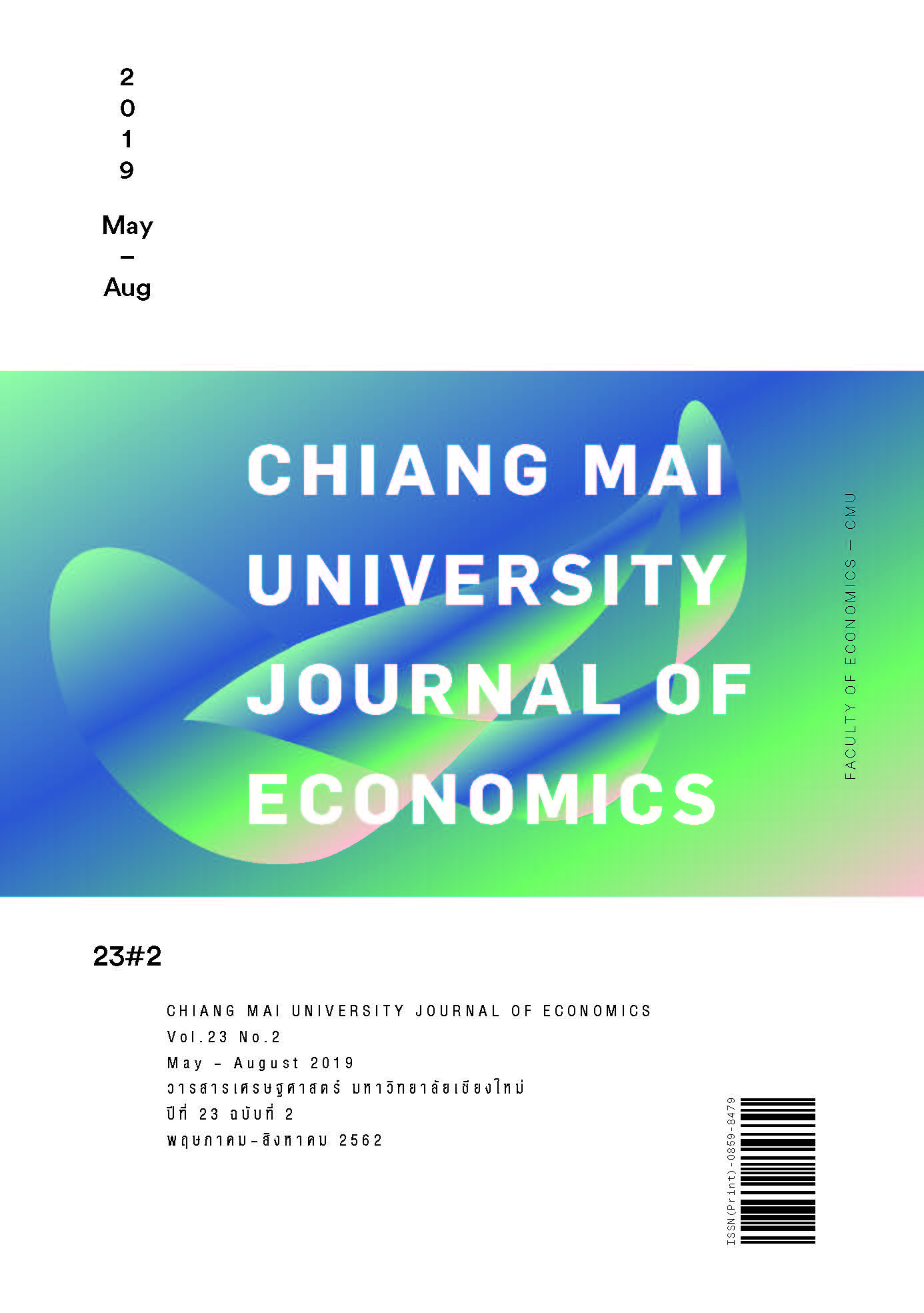The Spillover Effects of Global Economic Policy Uncertainty (GEPU) on Emerging Equity Markets: Evidence from Thailand
Keywords:
Economic Policy Uncertainty, Spillover, Stock Exchange of ThailandAbstract
This paper examines the spillover effects of Global Economic Policy Uncertainty (GEPU) index and other global risk factors, i.e. CBOE Volatility Index (VIX index), oil prices and gold prices, on the Stock Exchange of Thailand (SET). The empirical results show that both GEPU and VIX indices has significant impacts on the returns of stock market in Thailand before 2010. After 2010, GEPU have marginal effects on only the market returns. The effects of GEPU on the stock return are not statistically significant afternoon 2010. However, the VIX index still significantly affect the return and volatility of Thai stock market. These results provide supporting evidence that the VIX index is the most important indicators for the transmission of risks in international stock markets. However, the GEPU could also provide additional sources of spillover effects when GEPU move in the same direction with the VIX index. Finally, the spillover effects of VIX and GEPU are also found in the sectoral indices. The spillover effect of the resource sector is highest among the industrial indices in SET.
References
2. Badshah, I., Bekiros, S., Lucey, B. M., & Uddin, G. S. (2018). Asymmetric linkages among the fear index and emerging market volatility indices. Emerging Markets Review, 37, 17-31. doi:https://doi.org/10.1016/j.ememar.2018.03.002
3. Baker, S. R., Bloom, N., & Davis, S. J. (2016). Measuring Economic Policy Uncertainty. The Quarterly Journal of Economics, 131(4), 1593-1636.
4. BenSaïda, A., Litimi, H., & Abdallah, O. (2018). Volatility spillover shifts in global financial markets. Economic Modelling, 73, 343-353. doi:https://doi.org/10.1016/j.econmod.2018.04.011
5. Bollerslev, T. (1986). Generalized autoregressive conditional heteroskedasticity. Journal of Econometrics, 307-327.
6. Chancharat, S., Valadkhani, A., & Havie, C. (2007). The Influence of International Stock Makets and Macroeconomic Variables on The Thai Stock Market. Applied Econometrics and International Development, 7(1), 221-238.
7. Cho, D., & Rhee, C. (2013). Effects of Quantitative Easing on Asia: Capital Flows and Financial Markets. Econstor, 350, 1-21.
8. Christou, C., Cunado, J., Gupta, R., & Hassapis, C. (2017). Economic policy uncertainty and stock market returns in PacificRim countries: Evidence based on a Bayesian panel VAR model. Journal of Multinational Financial Management, 40, 92-102. doi:https://doi.org/10.1016/j.mulfin.2017.03.001
9. Diebold, F. X., & Yilmaz, K. (2008). Measuring Financial Asset Return and Volatility Spillovers, With Application to Global Equity Markets. NBER Working Paper(1-18), February 2008.
10. Ishfaq, M., Qiong, Z. B., & Rehman, A. u. (2018). Global Volatility Spillover in Asian Financial Markets. Mediterranean Journal of Social Sciences, 9(2), 109-116.
11. Jaiswal-Dale, A. (2009). Transmission of Shocks from Cross-Listed Markets to the Return and Volatility of Domestic Stocks. Finance Faculty Publications, 11.
12. Janrattanagul, J. (2009). The Effect of Change in Macroeconomic Data on Thailand Stock Market Returns. Xiamen University,
13. Kumar, D. (2014). Return and volatility transmission between gold and stock sectors: Application of portfolio management and hedging effectiveness. IIMB Management Review, 26(1), 5-16.
14. Liow, K. H., Liao, W.-C., & Huang, Y. (2018). Dynamics of international spillovers and interaction: Evidence from financial market stress and economic policy uncertainty. Economic Modelling, 68, 96-116.
15. Liu, Z., Ye, Y., Ma, F., & Liu, J. (2017). Can economic policy uncertainty help to forecast the volatility: A multifractal perspective. Physica A: Statistical Mechanics and its Applications, 482, 181-188.
16. Pástor, L., & Veronesi, P. (2012). Uncertainty about Government Policy and Stock Prices. The Journal of Finance, 67(4), 1219 - 1264.
17. Pongsakorn, S. (2010). Measuring Return and Volatility Spillovers in Global Financial Markets. (Bachelor' Thesis), Chulalongkorn University,
18. Raza, N., Jawad Hussain Shahzad, S., Tiwari, A. K., & Shahbaz, M. (2016). Asymmetric impact of gold, oil prices and their volatilities on stock prices of emerging markets. Resources Policy, 49, 290-301.
19. Smales, L. A. (2016). Time-varying relationship of news sentiment, implied volatility and stock returns. Applied Economics, 48:50, 4942-4960.
20. Tang, P. (2017). The Relationship between Gold Price, Euro, US Dollar, Oil Price and Stock Market. Case the European Union. University of Applied Sciences,
21. Tsai, I. C. (2017). The source of global stock market risk: A viewpoint of economic policy uncertainty. Economic Modelling, 60, 122-131.
22. Tursoy, T., & Faisal, F. (2018). The impact of gold and crude oil prices on stock market in Turkey: Empirical evidences from ARDL bounds test and combined cointegration. Resources Policy, 55, 49-54. doi:https://doi.org/10.1016/j.resourpol.2017.10.014
23. Wai, P. S., Ismail, T. M., & Kun, S. S. (2013). Commodity Price Effect on Stock Market: A Markov Switching Vector Autoregressive Approach. International Journal of Scientific & Engineering Research, 4(5), 19-24.
24. Whaley, R. E. (2000). The Investor Fear Gauge. The Journal of Portfolio Management, 26(3), 12-17.
25. Yu, H., Fang, L., & Sun, B. (2018). The role of global economic policy uncertainty in long-run volatilities and correlations of U.S. industry-level stock returns and crude oil. PLoS ONE, 13(2), 1-17.
26. Yu, H., Fang, L., & Sun, W. (2018). Forecasting performance of global economic policy uncertainty for volatility of Chinese stock market. Physica A: Statistical Mechanics and its Applications, 505, 931-940. doi:https://doi.org/10.1016/j.physa.2018.03.083
27. ศินี ตั้งทองหยก. (2553). ความสัมพันธ์ระหว่างเศรษฐกิจมหภาค อัตราผลตอบแทนทองคำ และอัตราผลตอบแทนหลักทรัพย์ในตลาดทุน. (การค้นคว้าอิสระปริญญาวิทยาศาสตร์มหาบัณฑิต (การบริหารการเงิน) ), มหาวิทยาลัยธรรมศาสตร์,
Downloads
Published
Issue
Section
License
All opinions and contents in the CMJE are the responsibility of the author(s). Chiang Mai University Journal of Economics reserves the copyright for all published materials. Papers may not be reproduced in any form without the written permission from Chiang Mai University Journal of Economics.






